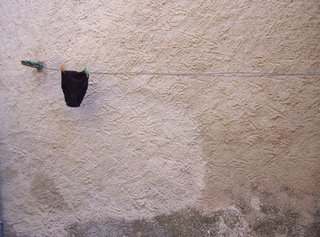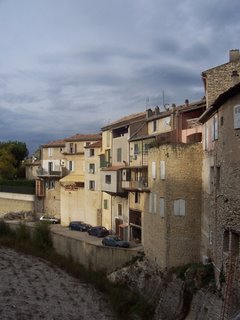School... really?
 Hello again. I've been an exceptionally negligent blogger, which of course only means that I've been busy and content. Major events of the last almost-month include: a weekend trip to Provence to visit the Freeman parents (along with Laura, Johann, and many members of the Hutzli family -- the photographs for this blog entry are drawn from that trip), managing to find myself a regular babysitting gig for two small bilingual girls (Clara and Juliet, ages 9 and 6 respectively), a great deal of falafel eaten and my very first-ever French university class assignment -- an oral presentation as a member of a group of me and three other kids, all French -- which brings us to today's subject, at the request of my parents: What School Is Like in France.
Hello again. I've been an exceptionally negligent blogger, which of course only means that I've been busy and content. Major events of the last almost-month include: a weekend trip to Provence to visit the Freeman parents (along with Laura, Johann, and many members of the Hutzli family -- the photographs for this blog entry are drawn from that trip), managing to find myself a regular babysitting gig for two small bilingual girls (Clara and Juliet, ages 9 and 6 respectively), a great deal of falafel eaten and my very first-ever French university class assignment -- an oral presentation as a member of a group of me and three other kids, all French -- which brings us to today's subject, at the request of my parents: What School Is Like in France. I'm taking four classes this semester, which I'll adress one at a time:
I'm taking four classes this semester, which I'll adress one at a time:-one with my program, called "Atelier d'écriture," which is basically an intensive French language and grammar class, specifically designed to eradicate all of our "anglicisms" and replace them with real, honest-to-God idiomatic French. This is my favorite class, for a number of reasons. First of all, I understand what's going on. It's the most like an American university class, in that it meets twice a week, for an hour and a half each time, there are about 12 kids in my class, it's heavily participatory, etc. etc. It's also my least difficult class -- all of the "homework" consists of one-page free-form essays about things like "A Movie I Saw Recently" and "What I Think About Parisian Fashion," which are graded not on their content but on the quality of the language employed within. The class itself is based on the errors made in these compositions -- that is to say, things we actually need to know. The professor is great, and everything we learn is immediately applicable -- we learn an expression, how to say, for instance "as you go along" (more or less -- it's "au fur et à mesure") -- and I read it later that afternoon in my copy of "Harry Potter et le Prince Sang-Melé", hear it on les infos, and hear my host mom's friend Marika use it in conversation over coffee on Sunday afternoon. Really helpful, really practical, and just kind of fun.

-University class #1 is "Théâtre documentaire et cinéma documentaire," which is, as you might expect, not at ALL about documentary films. The French are confusing. Let me explain to you my situation with this class: I was in a class about Jean Cocteau and Robert Bresson, which got canceled six weeks into the semester (after only meeting twice), because the professor was/is profoundly ill. Immediately afterward, my academic director at the program informed me that I would have to switch into a different class in the same department. Six weeks into the semester. I showed up for the class once -- it meets once a week--, didn't really understand what was going on (as I hadn't done any of the reading or seen any of the movies, so obviously), and was immediately enlisted into an exposé (presentation) group for two weeks later. OK, I thought, I can do this -- I'll have plenty of time to watch the movie and read the book (a play). And I'll have a class in between to figure out what's going on. Not so. My second class was canceled for the Toussaint holiday, and the play turned out to be impossible to find (and almost 300 pages long) -- the guy at the bookstore just laughed at me and told me "good luck!" when I told him I was looking for it. And the girl whose notes I borrowed made no sense and were not at all thorough. And the other kids in the group had four other exposés that week, so aren't really focussed on mine as much I am. It was awful. And I only have one other assignment with which to raise my grade. It's stressful. I did, however, get to hang out with some French kids -- so not a total loss.
 -My third and fourth classes are lit classes -- "Ecritures de l'Histoire et poétique de la violence" and "Parcours parallels: Afrique/Maghreb", both good-old fashioned comp lit classes with the fun twist that writing papers in France is nothing like writing papers in the US. The form is extraordinarily rigid -- an introduction paragraph, a paragraph which constructs the problématique, an announcement of your plan ("In the first part of this paper, I will address... ; in the second part, I will address..."), then three large sections, each of which address completely different aspects of the text, with no theme running through the three, necessarily; and then, the conclusion, which is basically just a recap of the intro -- it ends up being about 5 pages in all. Oh, and did I mention? They're handwritten. Which is completely normal here; I think when my third grade teacher told me that I would have to learn cursive because every teacher in high school would require me to write all my assignments in cursive, she really meant that I needed to learn cursive because she knew that I would be spending a year attending a French university. Too bad I didn't pay any attention to her. Anyway, I have one of these due Thursday. It should be pretty easy, but I'm petrified I'm going to mess up on something really stupid like forgetting to put the three requisite dots in the requisite 3-line space between my intro and the first grand partie.
-My third and fourth classes are lit classes -- "Ecritures de l'Histoire et poétique de la violence" and "Parcours parallels: Afrique/Maghreb", both good-old fashioned comp lit classes with the fun twist that writing papers in France is nothing like writing papers in the US. The form is extraordinarily rigid -- an introduction paragraph, a paragraph which constructs the problématique, an announcement of your plan ("In the first part of this paper, I will address... ; in the second part, I will address..."), then three large sections, each of which address completely different aspects of the text, with no theme running through the three, necessarily; and then, the conclusion, which is basically just a recap of the intro -- it ends up being about 5 pages in all. Oh, and did I mention? They're handwritten. Which is completely normal here; I think when my third grade teacher told me that I would have to learn cursive because every teacher in high school would require me to write all my assignments in cursive, she really meant that I needed to learn cursive because she knew that I would be spending a year attending a French university. Too bad I didn't pay any attention to her. Anyway, I have one of these due Thursday. It should be pretty easy, but I'm petrified I'm going to mess up on something really stupid like forgetting to put the three requisite dots in the requisite 3-line space between my intro and the first grand partie.
The classes themselves, of course, are different -- the professor, or the presenter, talks, the students take notes -- but not normal notes. Color coded notes, taken with four-color pens and three different highlighters, in perfect cursive, with the headings underlined USING A RULER. Everytime I'm pleased with myself for managing to draw a few key points out of a lecture, my pride is immediately deflated when I look at my neighbor and he (or she) has four pages of impeccably neat notes which look to be a near-word-for-word transcription of the lecture. The kids I'm going to school with have been specializing in literature since they were about 14, when they have to pick a track at lycée, so they've been immersed in the methodology and form for almost seven years -- it's a very different academic culture, and one I'm pretty sure I don't prefer, but it's nevertheless a little frustrating that I'm not familiar with it. The students seem to very much look at school as a job -- they take the metro there, take it home (most still live with their parents) -- school is school, studying is done at home, and they're certainly not there to socialize or make new friends -- although they may socialize with the friends they already have at the fac in the cafeteria or during instant-coffee-from-a-machine-and-cigarette breaks out in the courtyard. Although I'm loving being in Paris right now, I'm almost entirely sure that by the time the year's over, I'll be itching to get back to Haverford academics. Which is exactly the reminder I needed, I suppose.



0 Comments:
Post a Comment
<< Home